This book was the result of months of preparation, execution, collection, and assembly, so it goes without saying (yet Im saying it anyway) that it couldnt have been done without the effort of many talented individuals.
First and foremost, Id like to thank all the counselors who took time out of their busy schedules to fill out the survey that yielded the many hundred quotes youll find on the following pageseach and every one of them was instrumental in shaping this book, and their expertise and candor was (and still are) deeply appreciated.
Thanks are also due to my steadfast team of writers: Kerry Dexter, Elizabeth Faith, Naomi Rockler-Gladen, Landon Hall, Tom Haushalter, Michael Palumbo, and Kelly Smiththeir fine work with the written word made mine all the easier.
Also, thank you to Kim Howie, Scott Harris, and Kristen OToole for proving themselves, as always, to be a design and production team par excellence. Thanks, too, to David Soto and Ben Zelevansky for their speedy work in the mysterious underworld of surveys.
Finally, Id like to thank Rob Franek and Seamus Mullarkey for their guidance and vision, and most of all, thanks to the readers of this bookI hope you find everything hereafter to be more than useful in your college searches and applications. Good luck and keep learning.
Introduction
A Word Before Your First Steps on the Road to College
A long time ago, shortly after dinosaurs ceased walking the Earth, going to college after high school was a thing of rare privilege. Most likely, the only people who could seek out higher education were those of such a financially abundant background that they had little need to work and all the time in the world to study. Times, needless to say, have changed.
Nowadays, its become more and more rare for high school graduates not to head directly to collegein a way, its expected of them, and with the allure of independence and fun (along with a few challenging classes) they seem more than happy to go. Yet the process, while extremely rewarding, has gone from cut-and-dry to a virtual swampland of questions, forms, money, and confusion. And with more students than ever before going to college, school counselors find themselves spread thin when it comes to guiding them along the road to college. Thats where this book comes in.
To give you an idea of what youll be facing, take a look at these stats taken from The Princeton Reviews 2009 College Hopes & Worries Survey, which asked students and parents nationwide a series of questions about their feelings regarding the college admissions process. We received 10,388 responses (8,776 high school students applying to colleges and 1,612 parents of college applicants) and arrived at the following numbers.
When asked how they would gauge their stress level about the college application process, 43 percent of students and parents alike replied high.
When asked how they would rate the amount of information and support theyve received from their school guidance counselor to help them through their college applications for admission and financial aid, 31 percent of students and 30 percent of parents said they found the support adequate.
When asked what has been (or what they think will be) the toughest part of the college application experience, 32 percent of students said deciding which college to attend, while 31 percent of parents said writing college essays and completing applications.
When asked what their biggest concern about applying to or attending college will be, 37 percent of students and 34 percent of parents said they were worried they will get into first-choice college, but wont have sufficient funds/financial aid to attend.
There you have it. Students have questions. Parents have questions. Colleges have questions about the students. And between all this are the school counselors, working diligently to assuage everyones fearsand now theres The Portable Guidance Counselor, a book crafted by culling only the most informative answers from counselors themselves to the most important questions college applicants face. In order to do this, The Princeton Review created a survey that asked 100 of the most important questions high school students face when it comes to college. We then gave that survey to more than 2,500 counselors worldwide to see what they had to say. Receiving their replies, we went through each and every response to garner the information that fills this book. Truth be told, it was no easy job, but we feel that it has illuminated every corner of the college admissions process. From middle school to your first tuition payment, youll find everything you need to know here. allows you to look at the whole process from a counselors point of view. What are their greatest success stories? Their biggest defeats? What do they wish students would do more often and what advice do they have for them in order to stay ahead of the game?
As helpful, in our humble opinion, as this book is, its best used in conjunction with your parents, your friends and teachers and, most of all, your counselor. Explore your questions both here and with them in person. Maybe this will fill in some blanks after meeting with them. Maybe vice-versa. You can also visit PrincetonReview.com for tips and advice. There youll also find our Eye on Apply, where we check in with a diverse group of high school seniors as they navigate their way through the college admissions process, giving an inside perspective on picking schools, visiting campuses, writing essays, filling out applications, and more. Its a great way to get a clear view of what youll be facing come college admissions time. Either way, the best thing you can do to enhance the likelihood of you being accepted at your best fit college is to be as informed as possible. Its no joke or GI Joe moral: Knowledge is power. And in this situation, its not just half the battle, its the whole battle.
So good luck and keep your chin upthe college application process was never meant to be fun, but that doesnt mean it has to be stressful or difficult. Ask for help when you need it and stay focused on the end resultcollege! Weve been right where you are, so trust us when we say all your hard work will be more than worth it.
Chapter 1
What to Consider When
Considering Colleges
READY, SET, WHEN?!
 When should I start thinking about the college admissions process?
When should I start thinking about the college admissions process?
Kiko, 8th grader, New Mexico, plays softball, and she wants to go to a green school
Some students dream of careers that require college degrees while others dont know what they want to be when they grow up even after theyve grown up. Whether you asked for a stethoscope when you were six years old and have always seen college as part of your future, or whether you arent yet sure what you want out of your education, college counselors agree that its a good idea to keep your options open, which means planning your education early. You dont want to cut off possibilities and end up wasting time and money while wandering down a wrong course.


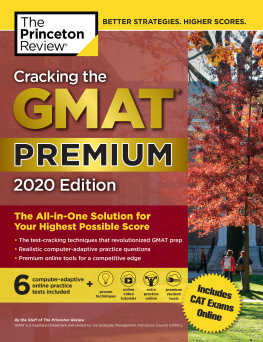
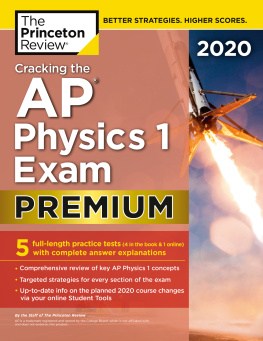
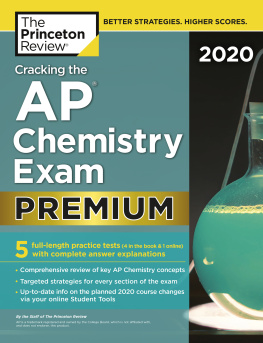
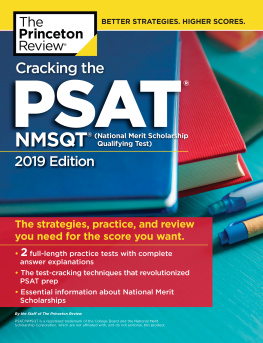
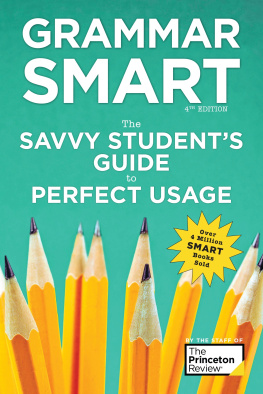
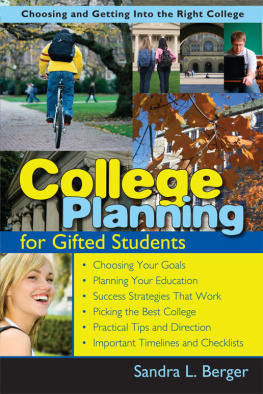
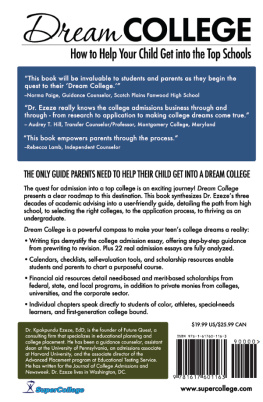
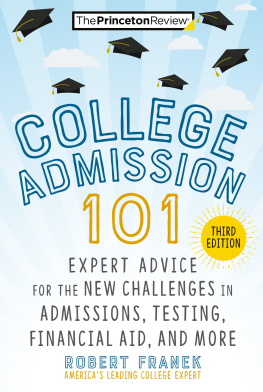
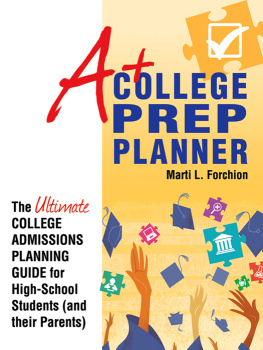
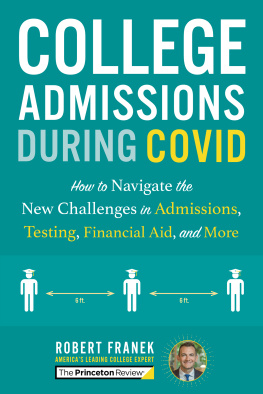
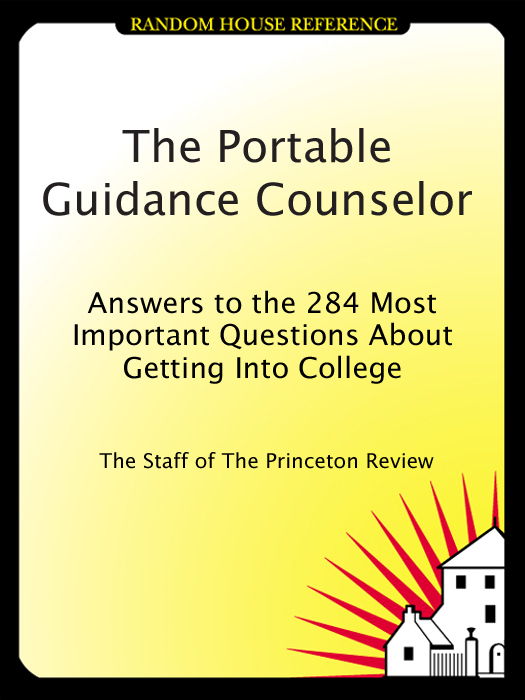
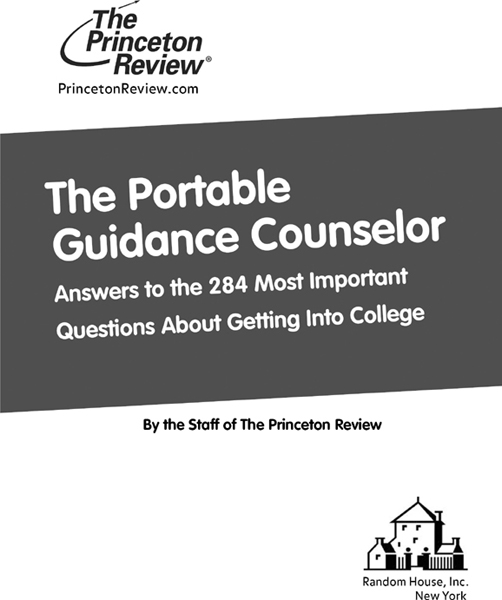
 When should I start thinking about the college admissions process?
When should I start thinking about the college admissions process?